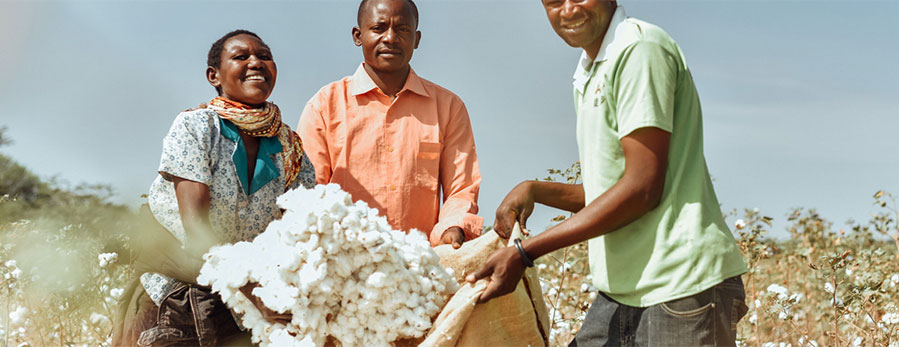#Raw Materials
World Cotton Day: Study shows positive influence of CmiA training and verification on the lives of small-scale farmers

Through Cotton made in Africa (CmiA), the AbTF is working with African cotton farmers and their families to improve their working and living conditions and to protect the environment. Syspons, an independent consulting firm, was commissioned to assess the effect of Cotton made in Africa’s activities to date. The resulting study shows that CmiA can improve the lives of the small-scale farmers and their families at many levels, in particular through its training activities.
According to the latest impact study, Cotton made in Africa (CmiA) positively affects the living and working conditions of participating cotton farmers. An area of strength is the training CmiA offers small-scale farmers, which has proven to lead to increased cotton yields if conducted regularly. It can also contribute to positive cultural shifts in the village communities, where awareness has grown for the importance of education, gender equality, children’s rights, health and environmental protection through better chemical-handling practices. For its part, the CmiA verification process proved helpful for the ongoing improvement of the local cotton companies’[1] management abilities, ultimately enabling them to enforce respect for issues like children’s rights, gender equality, and workplace safety.
Higher Productivity for CmiA Small-Scale Farmers in Côte d’Ivoire??In Côte d’Ivoire, the evaluation results revealed that a favourable market environment makes it possible for CmiA’s approach to reach its full potential. Combined with a stable cotton price set at the national level, the way the country’s cotton industry is structured has a beneficial effect and ensures the farmers’ income and planning stability. Under these circumstances, CmiA was able to offer the farmers steady knowledge transfers and skill development through its training programme. The resulting increase in adoption rates of good agricultural practices ultimately raised productivity, showing that Cotton made in Africa effected improvements in income security and income levels. Comparisons to data from 2015 reveal that the average farming family in Côte d’Ivoire is now earning nearly 18 percent more from CmiA cotton sales.
Climate Change and Market Environment Greatest Challenges for Small-Scale Farmers in Africa??The effects of climate change are already apparent and becoming increasingly noticeable. They represent a major challenge for small-scale farmers in Africa, especially due to erratic rainfall. The farmers are also facing pressure from declining soil fertility, which can be traced back to decreasing biodiversity and increasing pest infestations.?In Zambia, external market forces have additionally reduced the profitability and thereby the attractiveness of cotton cultivation for many small-scale farmers in recent years. Unlike in Côte d’Ivoire, AbTF was thus not able to fully realise CmiA’s full potential in Zambia. However, CmiA was able to employ its established training mechanisms to successfully reduce the harm done by unfavourable external factors, thereby slowing the further deterioration of the Zambian cotton farmers’ situation. Small-scale farmers who completed at least three training units produced yields around 23 percent greater than farmers who had not completed any training.
Growing Demand for CmiA Cotton Secures Future Investments for the Small-Scale Farmers and Environmental Protection??Cotton made in Africa will continually develop its training programme in order to expand its positive influence on living conditions in the village communities and to strengthen the small-scale farmers’ resilience to external factors. “In light of the progression of climate change and its implications for small-scale farmers, we will invest more strongly in climate-smart agricultural practices. We are happy that textile companies and brands have displayed steadily greater demand for CmiA-verified cotton in recent years. This enables us to secure financing for these forward-looking projects,” says Tina Stridde, Managing Director of the Aid by Trade Foundation.
By assessing Cotton made in Africa’s impact, the study grants AbTF key insights into the situation on the ground. It was conducted between October 2019 and June 2021 by Syspons, a well-regarded consulting company. The study evaluated how the training programme and the CmiA verification process affect the farmers’ living conditions. The two comprehensive case studies conducted in Zambia and Côte d’Ivoire involved household surveys of cotton farmers, focus-group discussions with village communities, and qualitative interviews with industry experts. In addition, all relevant documents and data were analysed, including the cotton associations’ self-assessments and verification reports, previously conducted sample-based surveys, and a baseline study from 2010.
https://cottonmadeinafrica.org/wp-content/uploads/CmiA-Impact-Study-2021.pdf
[1] Local implementation partners of the Cotton made in Africa initiative in Africa.
















